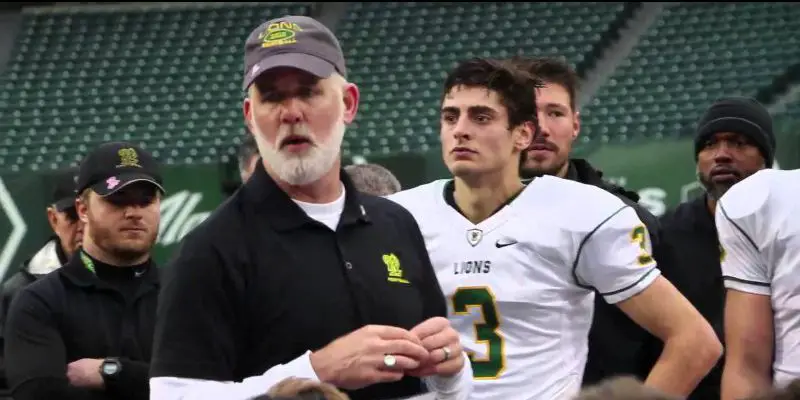Dan Fouts is the hall of famer. Marcus Mariota is the Heisman Trophy winner. Joey Harrington is the state of Oregon’s favorite son. And Chris Miller? Well, he’s just the one who started it all.
“Started what?” you’re asking.
Started the winning.
As we hit the thirty-year mark of Miller being drafted by the Atlanta Falcons with the 13th overall pick in the 1987 draft, it’s only fitting that we give Miller some love on what he accomplished with the Ducks.
When Rich Brooks pulled the redshirt and sent Chris Miller onto the field in 1983, Oregon football was in the dumps.
In the ten seasons (1973-’82) before Miller came to Oregon, the Ducks posted a 31-75-3 record. The simple math tell us that’s about three wins a year. Now take all the pain and misery Duck fans suffered in 2016 —make it a little worse — and do that for ten straight years.
No good.
Now just imagine if the four wins the Ducks had in 2016 wasn’t a regression, but rather a progression of Oregon football.
No thanks.
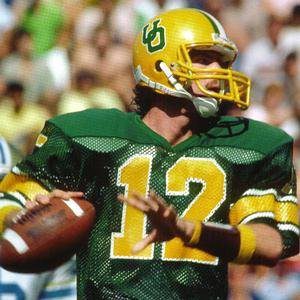
When Rich Brooks pulled Miller’s redshirt in 1983, Oregon football wasn’t very good.
Now in those ten years, the Ducks won more than four games only twice. To put that in perspective, from 2007-2016 the Ducks won the Pac-10/12 title four times. What that means is that over the past ten seasons it’s been twice as easy for the Ducks to win the conference title than it was back then to win five games.
No way.
Safe to say Oregon fans have become a little spoiled.
Coming off a promising 6-3-2 campaign in 1980, the Ducks backslid to post consecutive two-win seasons in ’81 and ’82, and were off to a slow start in 1983. Rich Brooks’ tenure as head coach was on thin ice, and talk of moving out of the Pac-10 to a lesser conference was prevalent.
All Pac-10 in ’85 and ’86, what Miller brought onto the field in 1983 was something Ducks fans hadn’t had in three years — hope.
With Miller behind center, you could enter Autzen Stadium knowing that the Ducks, no matter who they were playing, had a fighting chance. Which clearly hadn’t always been the case.
The Ducks finished 1983 at 4-6-1, which propelled them to 6-5, 5-6 and 5-6 records during the Miller era.
Mediocre for sure.
But what Miller did was rise the Ducks from college football’s abyss and into a competitive football program. He laid the groundwork for all the success that followed to this day.
Miller served as the bridge from Oregon’s not-so-great football past, to its modern day football of the future. Before a downtrodden two-win program can get to ten, eleven, or even twelve wins, it first has to get to six.
Of course six wins isn’t great but, dang it, somebody had to do it.
And from there the list continued, and continues, with the great names that have played quarterback at Oregon over the past thirty years.
But the one thing that remains the same is the name that started it all: Chris Miller
THE QUARTERBACKS OF THE 1987 DRAFT
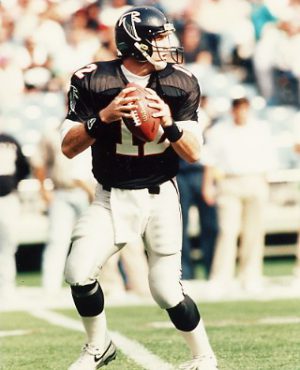
Oregon fan were elated when Miller was drafted 13th overall in 1987. Photo Credit: sportsthenandnow.com
By the spring of 1987, it was time for Miller to hand the baton to Bill Musgrave and wait for his name to be called at the NFL draft
Coming out of Oregon, Miller didn’t have the name recognition as some of the guys from big-time programs. Guys like Miami’s Vinnie Testaverde, Michigan’s Jim Harbaugh and Notre Dame’s Steve Bueurlein.
But Oregon fans knew Miller was just as good, if not better.
Fortunately, the pro scouts saw the same things that had endeared Ducks fans as Miller was drafted 13th overall by Atlanta.
Let’s take a glance back at Chris Miller and the other notable quarterbacks from the 1987 NFL Draft, and what they accomplished as pros:
(in order of draft selection)
VINNY TESTAVERDE
Drafted
Round one, Pick one. College: Miami
Teams
Tampa Bay Buccaneers (1987-92), Cleveland Browns (1993-1995), Baltimore Ravens (1996-97), New York Jets (1998-2003, ’05), Dallas Cowboys (2004), New England Patriots (2006), Carolina Panthers (2007)
Honors
Pro Bowl 2x (1996, ’98)
Career Stats
46,233 passing yards, 275 TD’s, 267 INT’s, 75.0 passer rating
Career Summary
Heralded as the next great NFL quarterback out of Miami, Testaverde may best be described as the most prolific journeyman quarterback of all-time.
Testaverde had some great moments (i.e. The “Monday Night Miracle” in 2000) and put up some big career stats, but most of that was due to his longevity. Though never blessed with a great team, in 21 seasons he only led his team to three post-seasons and had an overall starting record of 90-123-1.
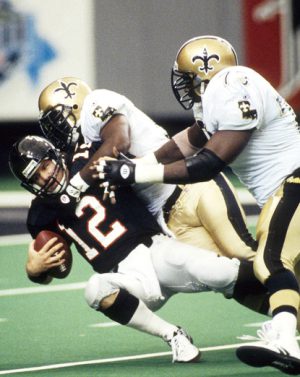
Miller made the Pro Bowl in 1991, unfortunately injuries cut his career short.
CHRIS MILLER
Drafted
Round one, Pick 13. College: Oregon
Teams
Atlanta Falcons (1987-’93), LA/St. Louis Rams (1994-’95), Denver Broncos (1999)
Honors
Pro Bowl (1991)
Career Stats
19,320 passing yards, 123 TD’s, 102 INT’s, 74.9 passer rating
Career Summary
Drafted by a bad Falcons team, Miller took over as the starter in his second season, which began a run of four solid seasons for him.
In 1991, with Deion Sanders anchoring the Falcons defense, Milller led the Falcons to their first playoff victory since 1978. In a wild-card game against the Saints, Miller threw for 291 yards, three touchdowns, and a 61-yard touchdown pass to win the game with 2 minutes 41 seconds left in regulation. 1991 also marked the peak of Miller’s career and, before injuries took over, he threw for 3103 yards, 26 touchdowns and made his only Pro Bowl.
JIM HARBAUGH
Drafted
Round one, Pick 26. College: Michigan
Teams
Chicago Bears (1987-’93), Indianapolis Colts (1994-’97), Baltimore Ravens (1998), Sand Diego Chargers (1999-2000), Detroit Lions (2001), Carolina Panthers (2001)
Honors
Pro Bowl (1995), AFC Player of the Year (1995), Comeback Player of the Year (1995), Runner-up NFL MVP (1995)
Career Stats
26,288 passer yards, 129 TD’s, 117 INT’s, 77.6 passer rating
Career Summary
After three years of backup duty, Harbaugh established himself as the Bears’ starter in 1990. Harbaugh signed with the Indianapolis Colts in 1994, where he went on to have his greatest success. 1994 was rather forgettable after splitting time with Don Majkowski (see below). But in 1995, Harbaugh had his best year as a pro and earned the nickname “Captain Comeback” for his ability to bring his team back late in games.
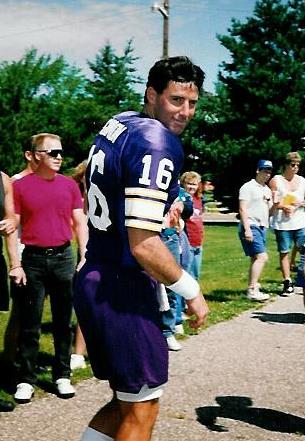
The Patriots drafted Gannon with the idea of switching him to running back
RICH GANNON
Draft
Round four, Pick 14 (98th overall). College: Delaware
Teams
New England Patriots (1987), Minnesota Vikings (1987-’92), Washington Redskins (1993), Kansas City Chiefs (1994-’98), Oakland Raiders (1999-2004).
Honors
NFL MVP (2002), Pro Bowl 4x (1999-2002), 1st Team All Pro (2000, 2002), AFC Player of the Year 3x (2000-2002), AFC Offensive Player of the Year 2x (2000, 2002), NFL Passing Leader (2002) (4689 yards)
Career Stats
28,743 passing yards, 180 TD’s, 104 INT’s, 84.7 passer rating, 2449 rushing yards, 21 rushing TD’s.
Career Summary
If only Rich Gannon had met up with John Gruden’s West Coast offense about ten years earlier, he may have gone down as one of the all-time greats. A right-handed version of Steve Young, Gannon’s first twelve years epitomized the role of backup journeyman. But in 1999, at age 34, Gannon began a spectacular four-year run which included an MVP award, a trip to the Super Bowl and multiple AFC Player of the Year and Offensive Player of the Year awards.
STEVE BEUERLEIN
Draft
Round four, Pick 26 (110th overall). College: Notre Dame
Teams
LA Raiders (1987-’90), Dallas Cowboys (1991-’92), Phoenix Cardinals (1993-’94), Jacksonville Jaguars (1995), Carolina Panthers (1996-2000), Denver Broncos (2001-2003)
Honors
Pro Bowl (1999), NFL Passing Yards Leader (1999) (4436 yards), Super Bowl XXVII Champion (Backup QB)
Career Stats
24,046 passing yards, 147 TD’s, 112 INT’s, 80.3 passer rating
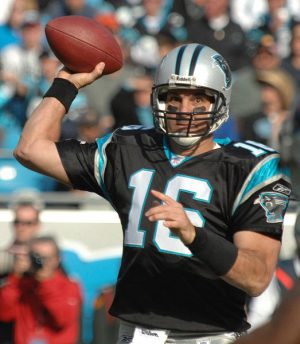
1987 number one overall pick Vinny Testaverde put up big stats in his twenty-one year career.
Career Summary
Eerily, like Rich Gannon, Beuerlein spent the first twelve years of his NFL career as a journeyman before exploding onto the scene in 1999 to lead the league in passing and earn a trip to the Pro Bowl.
But unlike Gannon, Beuerlein wasn’t able to sustain his late career success. After one more decent season, age and injuries caught to Beuerlein as he finished out his career as a backup in Denver.
DON MAJKOWSKI
Drafted
Round 10, Pick 4 (255th overall). College: Virginia
Teams
Green Bay Packers (1987-’92), Indianapolis Colts (1993-’94), Detroit Lions (1995-’96)
Honors
Pro Bowl (1989), NFL Passing Leader (1989) (4318 yards)
Career Stats
12,700 Yards, 66 TD’s, 67 Int’s, 72.9 Passer Rating
Career Summary
After splitting starting duties his first two seasons, The Majik Man’s career was defined by one magical season. In 1989, he broke out with 4,318 yards, 27 touchdowns, a trip to the Pro Bowl and a big offseason contract. Unfortunately, he suffered a torn rotator’s cuff in the 10th game of the 1990 season and was never the same. By 1992, Majkowski was cast off into the world of journeyman quarterback as the Packers brought in some guy named Brett Favre.
And the rest is history.
Darren Perkins
Spokane, Washington
Top Photo from Video
Darren Perkins is a sales professional and 1997 Oregon graduate. After finishing school, he escaped the rain and moved to sunny Southern California where he studied screenwriting for two years at UCLA. Darren grew up in Eugene and in 1980, at the tender age of five, he attended his first Oregon football game. His lasting memory from that experience was an enthusiastic Don Essig announcing to the crowd: “Reggie Ogburn, completes a pass to… Reggie Ogburn.” Captivated by such a thrilling play, Darren’s been hooked on Oregon football ever since. Currently living in Spokane, Darren enjoys flaunting his yellow and green superiority complex over friends and family in Cougar country.

